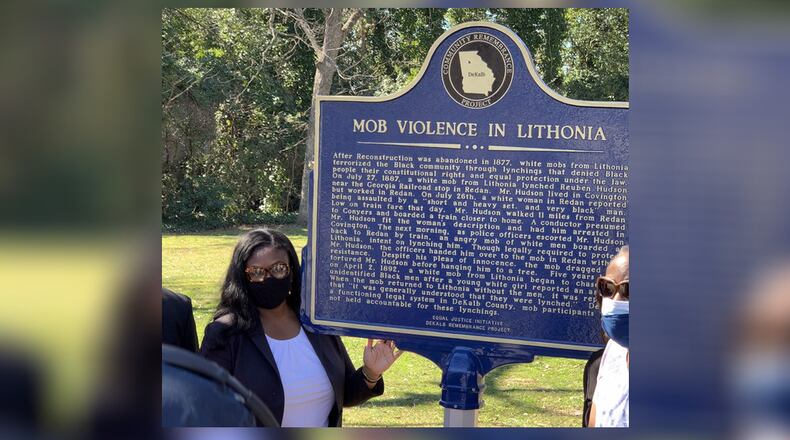Drivers traveling through the DeKalb County city of Lithonia may notice a new historical marker off the side of a downtown street.
One side of the plaque is titled, “Lynching in America,” while the other says, “Mob Violence in Lithonia.”
The marker was unveiled last week by the city and the DeKalb chapter of the NAACP as part of a project to memorialize lynchings of Black men that took place throughout the county. Lithonia Mayor Shameka Reynolds told The Atlanta Journal-Constitution that she never knew lynchings took place in her hometown city.
“I know it’s something that we don’t really want to talk about, honestly,” she said. “But these are things that we have to remember just to show us where we came from.”
The marker, located in Kelly Park off Max Cleland Boulevard and Bond Street, documents the stories of three Black men who were lynched by mobs of white residents in the late 1800s. The plaque says that, “Despite a functioning legal system in DeKalb County, mob participants were not held accountable for these lynchings.”
On July 27, 1887, Reuben Hudson was hanged after being accused — without a trial or evidence — of assaulting a white woman in Redan, an area just northwest of Lithonia, according to the marker. The plaque also mentioned two unidentified Black men were hanged five years later after a young white girl reported an assault.
The plaque’s reveal was documented in a video by DeKalb NAACP.
“It lets us know that today and going forward, we need to stay woke. We need to stay engaged,” DeKalb NAACP President Teresa Hardy said in the video. “We need to make sure we read up on our history, so we know where we’ve been and where we’re going. We must be bold in understanding that we belong here and that Black lives truly matter.”
Reynolds said the sign was supposed to be erected last year but was delayed due to the pandemic. She said Black History Month made the most sense as a replacement date.
The sign was revealed Feb. 24, which was a day after the one-year anniversary of Ahmaud Arbery’s death, whose name became a rallying call during last summer’s widespread protests against racism and police violence.
“We still have a lot of work to do,” Reynolds said. “We’re still not there, but thank God we’re not where we used to be. And I just don’t want people to forget.”
This is the third historical marker erected as part of the DeKalb NAACP’s Remembrance Project. The project began in 2019 and installed plaques in North Druid Hills and outside of the DeKalb County Courthouse. The project is also a partnership with the Alabama-based Equal Justice Initiative.
About the Author
Keep Reading
The Latest
Featured


